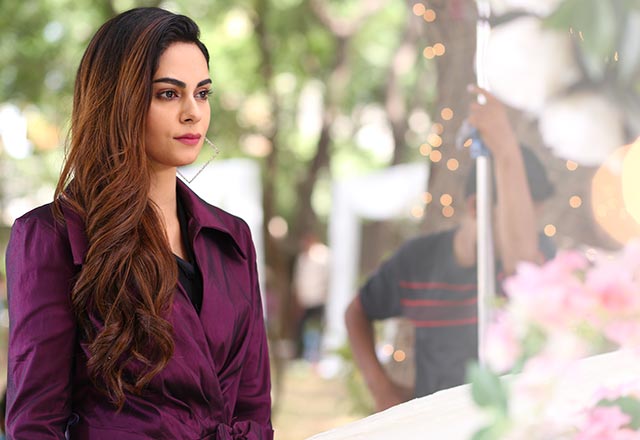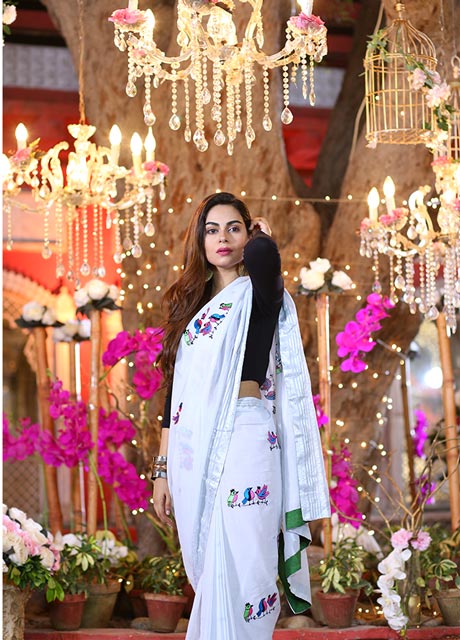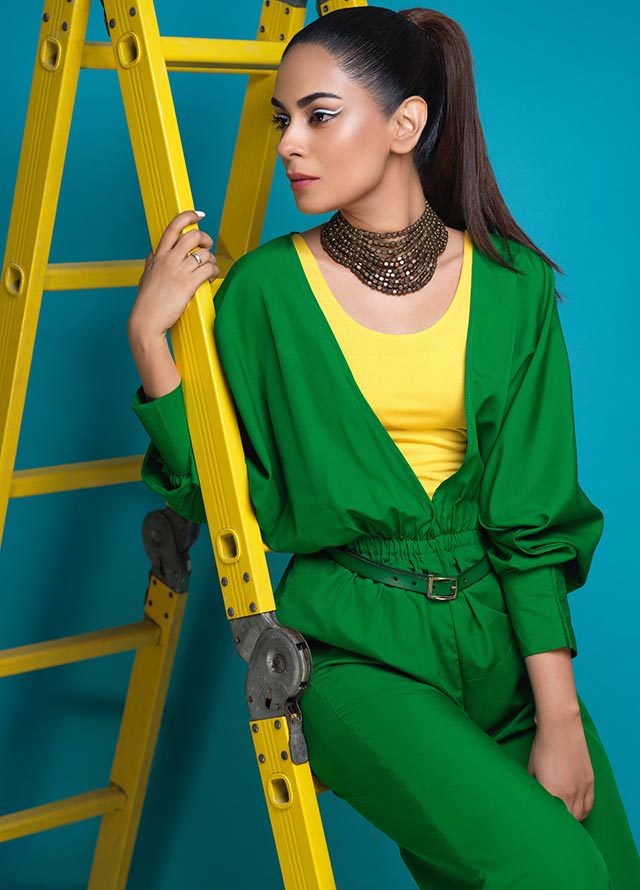
Newbie artist Amar Khan had a knack for acting as a youngster. She studied filmmaking at Beaconhouse National University, Lahore and discovered her passion for writing. She ventured in television and rendered standout performances in Belapur Ki Dayan and Dil-e-Gumshuda.
This year, we will see her take on two key roles in her feature film debut Dum Mastam opposite Imran Ashraf. Directed by the legendary artist Mohammad Ehteshamuddin, the promising star will serve as the main lead and scriptwriter for the movie.
Was acting accidental or by choice?
Amar Khan : By choice – I believe the call for action came to me in my mother’s womb. She is an actor herself. Certain things are inevitable and acting was one of them. I recall expressing myself openly in front of the mirror in my younger years. I knew I had an inherent drive to perform.
Prior to becoming an actor, what preparations were necessary for you to begin your creative journey in the showbiz fraternity?
Amar Khan: Just like becoming a doctor or an engineer, you get proper education, go through the grind of searching for good jobs and finally land prominent opportunities. Acting should be exactly that way. Film schools are everywhere around the world. People are studying, training, exploring more narratives and expressing themselves honestly. That said, one should read, do theater, watch movies and listen to good music. These factors, in totality make you more engrossed in your craft.
Social media can fool us into assuming that actors lead a seemingly perfect life. Have you ever experienced self-consciousness as a new entrant in this field?
Amar Khan: Yes, I have – you pay the price for it. Your focus should be on the fact that you are only acting when the cameras are rolling. Off camera, try being as human as possible.

You have played a negative role in Belapur Ki Dayan prior to starring in last year’s Dil-e-Gumshuda. What appeals to you in an antagonist and do you fear being typecast in that role so early on in your career?
Amar Khan: I feel Belapur Ki Dayan was not a negative role for me. There were two shades to the character; an innocent girl who winds up being murdered and her spirit returns in the form of a witch to avenge her death. The play connected with the audience because it was inventive.
Honestly, if you ask me, I don’t consider roles to be good or bad. One attempts characters that are exciting and have a voice of their own. The role of Alizeh in Dil-e-Gumshuda was that of a high school pass out girl who belongs to a rich family and is possessive and insecure. Alizeh was a human being despite these traits having a negative connotation. I never fear the typecast label as long as I am bringing in a lot of variety in my roles.
How do you intend to empower women through your craft?
Amar Khan: Luckily, I have always played dominating roles. It may have something to do with how I appear on screen. Nilofer in Belapur Ki Dayan had the power to make or break anything while Alizeh in Dil-e-Gumshuda was heavily manipulative. Both the characters were headstrong and that quality alone injects empowerment in women. Personally speaking, a strong woman has raised me and it reflects in my work too.
This year, you will make your feature film debut in Dum Mastam alongside Imran Ashraf. Tell us more about this project.
Amar Khan: I cannot disclose much but I am excited to have an incredible co-star Imran Ashraf working beside me, along with one of our finest directors Mohammad Ehteshamuddin and the most intelligent producer, Adnan Siddiqui. It is a dream team. For now, I am shooting Dum Mastam’s initial spell in Lahore. You will get to witness the magic soon in a cinema near you.
Do you feel that you can exercise your character in Dum Mastam to the maximum considering that you have authored the script yourself?
Amar Khan: I don’t think I can perform my character better because I have written it. As an artist, I will perform any character with ease irrespective of who writes it. Yes, you may have an advantage, as you know the story inside out.
What drew you to writing?
Amar Khan: We had to write our monologues for our creative writing and theater class. It was the first time my teacher took me in confidence to tell me that I have good creative writing skills and should use them to express myself. That is when I took off in my career after graduating as a filmmaker, specializing in screenwriting.

Some consider acting to be child’s play, which it isn’t. What makes this profession tough?
Amar Khan: Imagine this; we are here in Lahore shooting for Dum Mastam in a freezing winter. I am dancing to the best of my abilities bare feet in a chiffon dress. No way is this profession easy! It is not as glittery and glamorous as one would normally perceive. Acting is one of the most important fields that we have. We are not only entertaining but also affecting lives, communicating emotionally and triggering necessary change through an empowering domain.
We are constantly depicting drama stories that revolve around divorces, schemes, adultery and victimization of women. Is it not time to move beyond tedious storylines that have been recycled repeatedly in the past?
Amar Khan: Definitely – we are in a progressive world right now and have accessibility to digital platforms that depict advanced versions of storytelling and characterization. Many no longer hold women as victims or targets of violence. Vast mediums exist to bring changes in thought so we are obliged to tell stories that consider women and their instrumental voices.
Although these drama narratives aim to inspire viewers with tactics of social messaging, they are also subconsciously encouraging youngsters and adults to mimic vile characters. Do you acknowledge that? How is this responsible storytelling?
Amar Khan: It does influence us but this medium alone cannot change one’s temperament. Your surroundings, education and upbringing develop your personality too. Stories shall remain good stories and we shouldn’t just underlie the positives. Narratives are flawed and so are characters. It depends on how you take them. Yes, we do have a responsibility when it comes to storytelling. For instance, if an onscreen rapist influences a viewer and he impersonates that character in real then I suppose there is a major manufacturing default within the person; a story has nothing to do with it.
How do you approach a character?
Amar Khan: The character and script speak to you. They trigger you to approach a fictional person the way you would want. While reading my role in Belapur Ki Dayan, I had in mind some haunting sound effects. I began listening to similar music. My vision for Nilofer helped me get into the skin of that character.

Is it difficult for an artist to embrace a character if the director opposes his or her vision in bringing that role to life?
Amar Khan: I don’t think so. When we say we are a director’s actor, we imply that we are open to discussions, brainstorming, script reading and exploring more options. That is a fun process as you let all the thoughts sink in and provide your individual input in creating something phenomenal.
Which character do you aspire to play in the future?
Amar Khan: I have no clue – I take life as it comes. Whichever character excites me, I try my best performing it.
As a new artist, what do you hope to see different in your line of work?
Amar Khan: As you had mentioned earlier in your question, stories that are more progressive. Not the typical TRP breakers but something of their own kind.
What is unique about you?
AK: You should be telling me that (Laughs).
INTERVIEW: HAIDER RIFAAT
PHOTOGRAPHS COURTESY OF AMAR KHAN
![]()











































